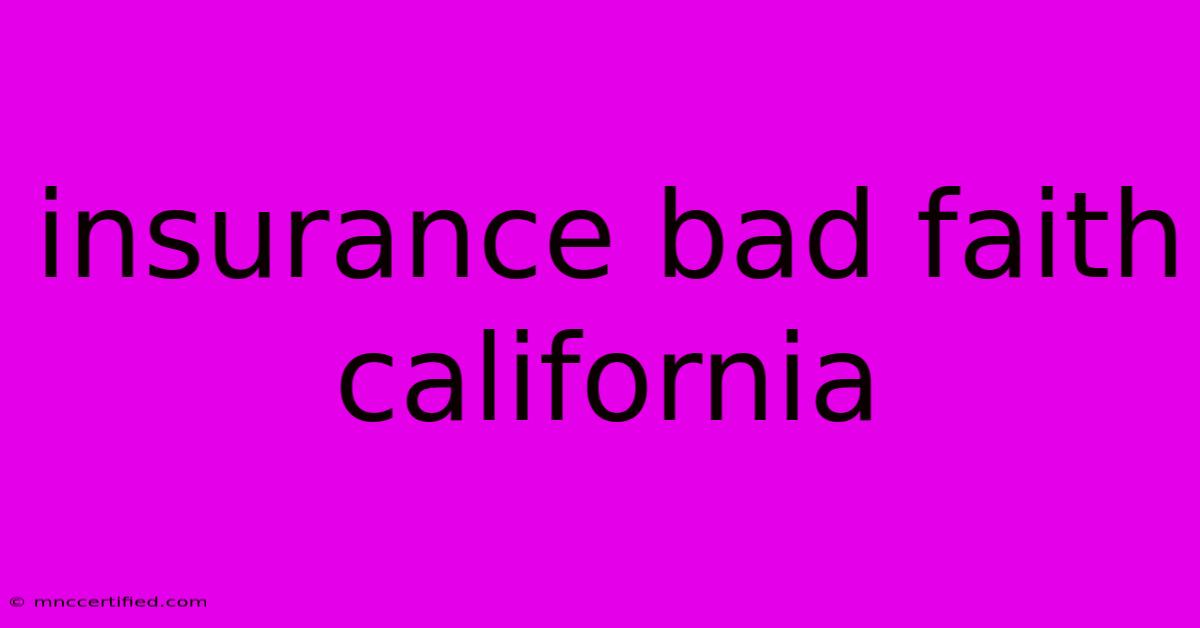Insurance Bad Faith California

Table of Contents
Insurance Bad Faith in California: Understanding Your Rights and Recourse
Navigating the insurance claims process can be stressful, especially after experiencing a significant loss. In California, insurers have a legal duty to act in good faith and deal fairly with their policyholders. When they fail to do so, it constitutes insurance bad faith, a serious breach of contract that can have significant consequences. This article provides a comprehensive overview of insurance bad faith in California, helping you understand your rights and how to proceed if you suspect your insurer has acted unfairly.
What Constitutes Insurance Bad Faith in California?
Insurance bad faith in California involves an insurer's unreasonable or wrongful conduct in handling a claim. This can manifest in various ways, including:
Common Examples of Insurance Bad Faith:
- Unreasonable Delay or Denial of a Claim: This is a frequent form of bad faith. Unjustifiable delays in investigating, evaluating, or paying a legitimate claim can be considered bad faith, especially if the delay causes the insured additional hardship. The insurer must act promptly and reasonably throughout the claims process.
- Failure to Investigate a Claim Thoroughly: Insurers have a duty to conduct a thorough and fair investigation of claims. Failing to obtain necessary evidence, interview witnesses, or properly assess the damages can constitute bad faith.
- Failure to Communicate Effectively: Insurers are expected to maintain open and honest communication with their policyholders throughout the claims process. Ignoring phone calls, failing to provide timely updates, or providing misleading information can all be considered bad faith.
- Offering Unfair Settlements: Insurers must offer settlements that fairly compensate the insured for their losses. Offering a settlement that is significantly below the actual value of the claim can be evidence of bad faith. Lowball offers are a common tactic.
- Using Unethical Tactics: This encompasses a range of behaviors including but not limited to: intimidation, threats, and misrepresentation of policy terms.
Crucially: The mere fact that an insurer denies a claim doesn't automatically equate to bad faith. However, the manner in which the claim is denied is key. If the denial is based on a lack of investigation, false information, or arbitrary reasons, it could constitute bad faith.
Proving Insurance Bad Faith in California
Proving insurance bad faith requires demonstrating that the insurer acted unreasonably and that this unreasonable conduct caused the insured harm. This often involves gathering substantial evidence, such as:
- Documentation: Preserve all communication with the insurer, including emails, letters, and phone records. Keep copies of all claim forms, medical records, repair estimates, and other relevant documents.
- Expert Testimony: Expert witnesses, such as insurance professionals or financial experts, can provide valuable testimony regarding the reasonableness of the insurer's conduct.
- Witness Testimony: If you have witnesses who can corroborate your account of the insurer's actions, their testimony can be crucial.
Remedies for Insurance Bad Faith in California
If you successfully prove insurance bad faith, you may be entitled to various remedies, including:
- Coverage of the Claim: The insurer will be required to pay the full amount of the claim, including any additional damages resulting from the bad faith conduct.
- Punitive Damages: In cases of egregious bad faith, the court may award punitive damages to punish the insurer and deter similar conduct in the future. Punitive damages can be substantial.
- Attorney Fees: California law often allows the prevailing party in a bad faith case to recover their attorney's fees. This is a significant consideration.
- Emotional Distress Damages: If the insurer's bad faith conduct caused you significant emotional distress, you may be able to recover damages for that as well.
Seeking Legal Counsel
Navigating insurance bad faith claims can be complex. If you suspect your insurer has acted in bad faith, it's crucial to seek legal counsel from an experienced California insurance bad faith attorney. They can assess your situation, advise you on your rights, and help you build a strong case. Don't hesitate to contact an attorney; your rights are protected under California law. Early consultation is vital.
Keywords: Insurance Bad Faith California, California Insurance Bad Faith, Insurance Bad Faith Lawyer California, Insurance Claim Denial California, Unfair Insurance Practices California, Lowball Settlement California, Insurance Claim Investigation California, Punitive Damages Insurance California, Attorney Fees Insurance Bad Faith California.
This article provides general information and should not be considered legal advice. It is essential to consult with a legal professional for advice tailored to your specific situation.

Thank you for visiting our website wich cover about Insurance Bad Faith California. We hope the information provided has been useful to you. Feel free to contact us if you have any questions or need further assistance. See you next time and dont miss to bookmark.
Featured Posts
-
Aurora Illinois Auto Insurance
Nov 27, 2024
-
National Lloyds Insurance Waco
Nov 27, 2024
-
Arsenal Injury Boost Artetas Good News
Nov 27, 2024
-
Wendy Williams Health Update Revealed
Nov 27, 2024
-
Psg Vs Bayern Munich Live Ucl Score
Nov 27, 2024